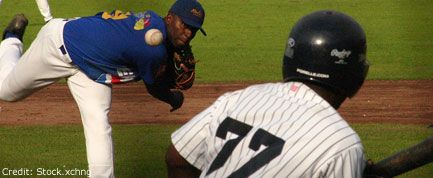Study: Major League Baseball Gives Underdogs a Break

The 162-game major league baseball season may give underdogs a leg up in getting to the playoffs, say a pair of physicists.
Sports fans usually expect the top teams in any sports league to come out on top at the end of the season with the best record, but every now and then a less-skilled team jumps to the head of the pack, as many say was the case when the "wild card" Florida Marlins got their shot at and won the 2003 World Series.
Two physicists at the Los Alamos National Laboratory in New Mexico ran simulations of league play to see how many baseball games National League teams would have to play in the regular season to ensure that the best team came away with the best record. The answer: a whopping 256 games.
Because there's always some chance that a lesser team will win any given game, teams would have to play a larger number of games to overcome statistical randomness—specifically, the number of games should be the cube of the total number of teams, write Eli Ben-Naim and Nick W. Hengartner in an upcoming issue of the journal Physical Review E.
The best baseball teams still have an advantage over the best football teams though; the number of teams in the NFL is about the same as the in the Major Leagues, but with far fewer games, making the outcome of the football season much more random.
- Video: How To Throw a Split Finger Fastball
- Mathematician: Yankees Will Dominate Baseball This Year
- Life's Little Mysteries
Sign up for the Live Science daily newsletter now
Get the world’s most fascinating discoveries delivered straight to your inbox.

Andrea Thompson is an associate editor at Scientific American, where she covers sustainability, energy and the environment. Prior to that, she was a senior writer covering climate science at Climate Central and a reporter and editor at Live Science, where she primarily covered Earth science and the environment. She holds a graduate degree in science health and environmental reporting from New York University, as well as a bachelor of science and and masters of science in atmospheric chemistry from the Georgia Institute of Technology.











